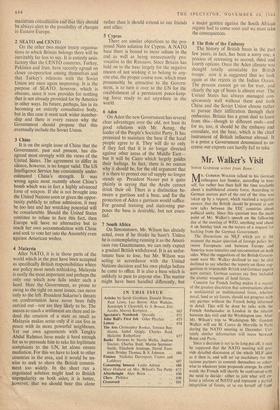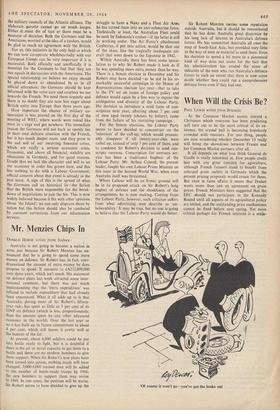Mr. Walker's Visit
SARAH GAINDAM writes front Bonn: MR. GORDON WALKER talked to his German colleagues last Sunday, according to him- self, for rather less than half the time available about a multilateral atomic force. According to German sources part of the rest of the time was taken up by a request, which received a negative answer, that the British should be present at any new talks between the EEC countries about political unity. Since this question was the main point of Mr. Walker's speech on the following day at the meeting of WEU, anything said about it on Sunday took on the nature of a request for backing from the German Government.
The discussions on Mk.F which are at the moment the major question of foreign policy be- tween Europeans and between Europe and America were tentative and uncommitted on both sides. What the suggestions of the British Govern- ment were Mr. Walker declined to say; he also declined to say whether the reports on those sug- gestions in responsible British and German papers were correet. German sources say they included the atomic weapons of land forces.
Concern for French feeling makes it a matter of the greatest discretion that conversations about a multilateral or multinational force, whether naval, land or air forces, should not progress with any partner without the French being informed in detail. This will be done by talks with the French Ambassador in London in the interim between this visit and the Washington one. After Mr. Wilson's trip to Washington Mr. Gordon Walker will see M. Couve de Murville in Paris during the NATO meeting in December. Cer- tainly similar information will move between Bonn and Paris.
Since a decision is not to be long put off, it may be supposed that the NATO meeting will pro- vide detailed discussion of the whole MLF idea as it then is, and will set up machinery for the various partners to commit themselves or, other- wise to whatever joint proposals emerge. In other words the French will shortly be confronted with the need to decide: either to join what will en- force a reform of NATO and represent a partial integration of forces, or to cut herself off from the military councils of the Atlantic alliance. The elaborate .gavotte cannot go on much longer. Either it must die of tact or there must be a moment of .decision. Both the Germans and the Americans,.worried at the idea of a tandem, would be glad to reach an agreement with the British.
For us, this initiative in the only field in which We can now co-operate wholeheartedly with our European friends can be very important if it is sucdessful. Both officially and unofficially It is essential for the Germans to feel that they are our equals in discussions with the Americans. The special relationship we believe we enjoy should be played down or abandoned by us in all official utterances; the Germans should be kept informed with the same care and courtesy we use towards the French. We need them urgently and there is no doubt they are now less eager about British entry into Europe than three years ago.
How important the chance of military co- operation is was proved on the first day of the meeting of WEU, where words went round like mice in a cage and got nowhere. The immediate reason the Germans will not back us openly lies in their own delicate situation with the French, but it has much deeper roots, and they grow in the sad soil of our recurring financial crises, Which: are really a serious economic crisis. Economic, and above all financial, stability are obsessions in Germany, and for good reasons. Doubt that we lack the character and will to set our economy in order has grown here, and this has nothing to do with a Labour Govrnment; official concern about that event is already in the past tense. A sign of this is the spread of what the Germans call an historical lie—the fiction that the British were responsible for the break- down of negotiations to join the Six. This is now Widely believed because it fits with other opinions about 'the Island'; we can only disprove those by action but this fiction should also be combated by constant corrections from our information services.



































 Previous page
Previous page